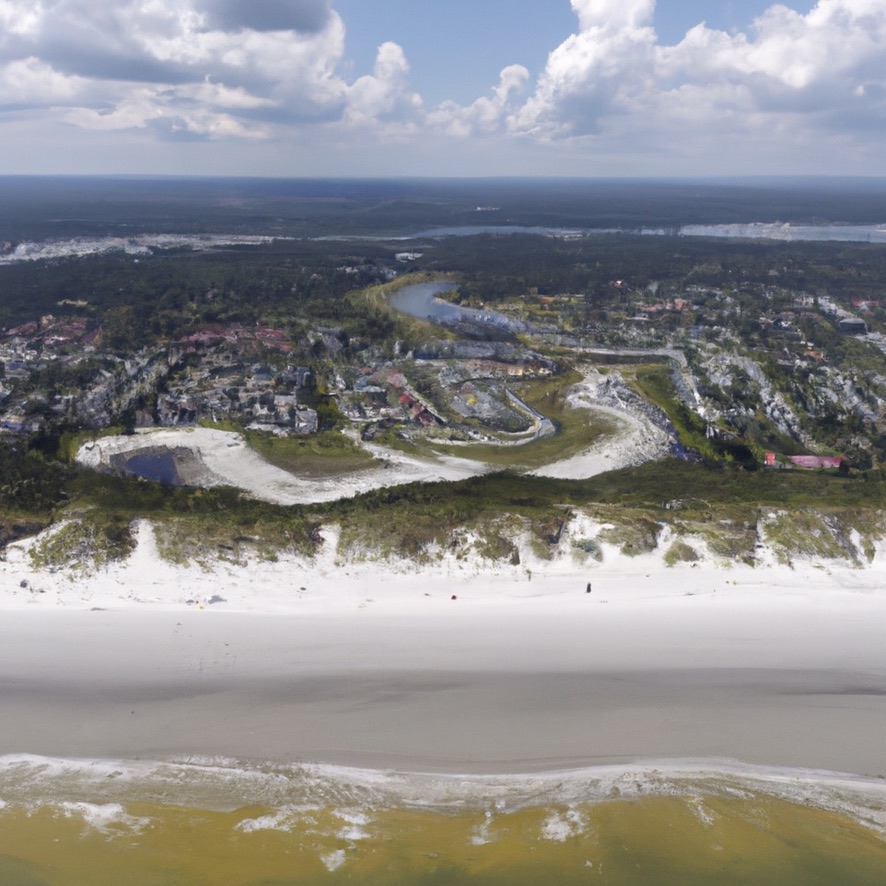Amelia Island is a 13-mile long barrier island located in northeastern Florida, near the border with Georgia, known for its pristine beaches, historic sites, and natural beauty. The island is only about 4 miles wide at its widest point, but it is home to a wide variety of landscapes and features. Starting from the northern tip of the island, you’ll first come across the Fernandina Beach Historic District, a charming area with a variety of well-preserved Victorian homes and other historic buildings. As you continue south, you’ll pass by several parks and nature preserves, including Amelia Island State Park and Fort Clinch State Park, which offer hiking, biking, and fishing opportunities.
The island’s east coast is home to some of the most beautiful beaches in the area, with miles of white sandy beaches and crystal clear waters. The beaches are perfect for swimming, sunbathing, and other water activities. As you travel further south, you’ll come across the American Beach, a historic African American beach community, and the Ritz Carlton and Omni Hotels. I grew up and currently live on the south end of Amelia Island and it remains one of my favorite places to work and play in the world. I am very grateful to have grown up in such a sleepy, beautiful town.
The island also has a rich history, with sites such as the Fernandina Beach Historic District and the Amelia Island Lighthouse, which date back to the 19th century. Additionally, Amelia Island is home to many luxury resorts, spas, and restaurants, making it a popular destination for tourists.
What facts are important when buying real estate on Amelia Island?
Buying real estate here can be a great investment, as the island is a popular tourist destination and has a strong economy.
Here are some things to consider when buying real estate on Amelia Island:
- Location: Amelia Island has several different neighborhoods, each with its own unique character. Consider what kind of location you’re looking for, whether it’s a quiet residential area or a more bustling tourist spot.
- Property type: Amelia Island offers a variety of property types, including single-family homes, condos, townhouses, and vacation rental properties.
- Budget: Real estate prices on on the island can vary greatly depending on the location, property type and size. Be sure to have a clear idea of your budget and what you can afford before beginning your search.
- Market conditions: It’s important to understand the current market conditions when buying real estate on Amelia Island. You may want to consult with a local real estate agent to get a better understanding of the market trends and the best time to buy.
- HOA Fees: As a great real estate broker once proclaimed, “you never really own a condo.” One of the most important components of condominium real estate on Amelia Island can be the HOA fees, which in some instances can be over $1,000 a month and do not result in additional equity being built in your property/investment. Keep in mind that you will have very limited control over the fees and they can increase significantly during your ownership, as is evidenced by the dramatic increase in fees in the last few years.
It is also recommended to hire a real estate agent who is familiar with the area, can help you find properties that match your criteria, and guide you through the buying process. They can also help you understand the local laws and regulations regarding real estate purchases. It’s also a good idea to have a Amelia Island home inspector check out the property before you buy it to ensure that it’s in good condition and that there are no major issues that could affect its value. I highly recommend Kyle Williams with Solid Foundation Home Inspections. Kyle is native to Amelia Island and is someone I have worked with and trust (as well as have known for over 20 years).
Overall buying real estate on Amelia Island can be a great investment, with a good mix of rental income and appreciation potential. However, it’s important to do your research and consider all factors before making a decision. Feel free to call my office, if you need pointers. We love helping new folks navigate the Florida real estate scene.
What should I look for in a real estate agent on Amelia Island Florida?
When looking for a real estate agent on Amelia Island, Florida, there are a few key factors to consider:
- Local knowledge: Look for an agent who is familiar with the area, including different neighborhoods and their amenities, as well as local real estate market conditions.
- Experience: It’s important to work with an agent who has experience buying and selling properties locally. Look for an agent who has a proven track record of successful transactions.
- Communication: A good real estate agent should be responsive and easy to communicate with. Make sure the agent you choose is someone you feel comfortable talking to and who is able to answer all of your questions.
- Professionalism: Look for an agent who is licensed and affiliated with a professional organization such as the National Association of Realtors (NAR).
- Specialty: if you are looking to buy or invest in a vacation rental property, look for an agent who specializes in vacation rental properties and has experience in this field.
- Reputation: Look for an agent with a good reputation in the community. You can ask for references and check online reviews to get an idea of an agent’s reputation.
It’s important to interview a few agents before making your decision and choose someone you feel comfortable working with and who you trust to help you find the right property for your needs.
I suggest working with the following brokers and agents who are trusted friends whom I have known and/or worked with for a long time. Most of these people I have grown up with, and they represent the elite real-estate industry that dominate the market today.
Should I get a lawyer when I purchase a property?
Although not absolutely necessary it is a good idea to hire a real estate lawyer to assist you in the process. A real estate lawyer can help you with the following:
- Reviewing and understanding the purchase contract: A real estate lawyer can review the purchase contract and explain the legal terms and conditions to ensure that you understand what you are agreeing to.
- Reviewing title and property ownership: A lawyer will review the title of the property to ensure that it is clear and that there are no outstanding liens or judgments that would affect your ownership of the property.
- Reviewing and handling closing documents: A lawyer will review and handle the closing documents, including the title transfer and mortgage documents, to ensure that everything is in order and that the closing process goes smoothly.
- Handling legal issues or disputes: If there are any legal issues or disputes that arise during the purchase process, a real estate lawyer can advise you on your rights and options and represent you in any legal proceedings.
- Advising on local laws and regulations: A lawyer will be familiar with local laws and regulations and can advise you on any potential issues that may affect your purchase.
It’s important to note that in some states, the use of attorney during a real estate transaction is not mandatory and the process can be handled by a title company or escrow company. However, having a real estate attorney can provide you with the legal knowledge and expertise to ensure that your interests are protected throughout the process.

What I look for when insuring my property on Amelia Island?
When insuring your property on Amelia Island, there are a few key factors to consider:
- Coverage: Make sure that your insurance policy covers the full replacement cost of your property and any structures on the property, such as a garage or shed. It’s also important to consider additional coverage for flood or hurricane damage, as Amelia Island is located in a coastal area. You can check a potential property’s flood zone on the FEMA website.
- Liability coverage: Consider adding liability coverage to your policy, which will protect you in case someone is injured on your property and sues you for damages.
- Additional living expenses: Make sure that your policy includes coverage for additional living expenses in case you need to temporarily relocate while your property is being repaired or rebuilt.
- Special Coverage: If you are planning to rent out your property as a vacation rental, you will need special coverage for the rental use. Make sure that your insurance policy covers the risks associated with renting out the property.
- Insurance company: Look for an insurance company that has experience insuring properties in Amelia Island and has a good reputation for handling claims promptly and fairly.
- Discounts: Ask your insurance agent if there are any discounts available, such as a multi-policy discount if you bundle your home and auto insurance with the same company.
It is important to shop around and compare different insurance policies and companies, to find the best coverage at the most affordable price. It’s also a good idea to review your insurance policy regularly and update it as needed to ensure that you are fully protected at all times. The only insurance agent that I have worked with on Amelia Island and trust with confidence is Trey Spencer with the Tatum Agency.
What is the average home price on Amelia Island?
The average home price can vary depending on several factors such as location, size, property type, and current market conditions. As of 2021, the average home price on Amelia Island is around $400,000. It’s hard to get a house on the island for anything less than $350,000 in the current market conditions. In general, properties closer to the beach, especially those with short-term rental potential, tend to be more expensive, while properties in more residential areas tend to be less expensive.
It’s also important to keep in mind that property prices can fluctuate depending on the state of the market, so it’s a good idea to consult with a local real estate agent to get a more accurate picture of current prices.
What does a residential real estate closing look like when buying a property on Amelia Island?
A residential real estate closing is the final step in the process of buying a property on Amelia Island. Here’s an overview of what a typical closing process might look like:
Review and sign closing documents: Before the closing date, you will receive a package of closing documents to review and sign. These may include the purchase contract, mortgage documents, and title transfer documents.
- Home inspection: Before closing, a home inspection will be done to ensure that the property is in good condition and that there are no major issues.
- Title search: Before closing, a title search will be done to ensure that there are no outstanding liens or judgments on the property that would affect your ownership.
- Final walk-through: Before closing, you will do a final walk-through of the property to ensure that it is in the condition that was agreed upon in the purchase contract.
- Closing day: On the closing day, you will meet with the seller, your real estate agent, and the closing attorney to sign the closing documents and transfer the ownership of the property.
- Fund transfer: On the closing day, the purchase price of the property will be transferred from you to the seller, typically through a wire transfer or a cashier’s check.
- Transfer of keys: Once the funds have been transferred, the seller will transfer the keys to the property to you, and you will officially become the new owner of the property.
Keep in mind that the closing process may vary depending on the specific details of the transaction, such as the type of financing or the type of property being purchased. In Amelia Island, it is common for buyers and sellers to have their own attorney to represent them and assist them during the closing process. It is also common for the closing process to be handled by a title company or escrow company, which will take care of all the necessary paperwork and ensure that the closing process goes smoothly.
Please contact us, if there is we can help you with your real estate questions or purchase. If you are considering moving to Amelia Island, we highly recommend you visit. Give our office a shout if you are in town! We love showing guests and visitors the stunning beauty of this island.


